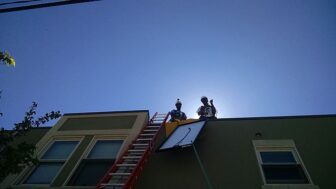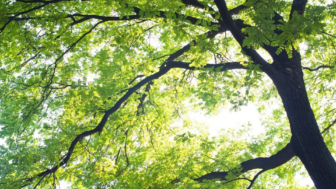By IJ Chan
JMU students and Harrisonburg residents are joining the national fight against the Keystone XL pipeline.
The 2,147 mile long Keystone XL pipeline currently brings crude oil from Canada to the U.S. Midwest. A 1,700-mile long extension would carry the oil through to Texas. Many people nationwide are concerned that the installation of the pipeline would bring devastation to the environment by severely polluting the air, water and soil with excessive carbon emissions.
On Friday, Sen. Mark Warner publicly expressed support for Keystone XL’s construction. In response, local environmental groups including the Chesapeake Climate Action Network, 350.org and the Sierra Club organized a protest in downtown Harrisonburg to meet Warner as he came into town for a business meeting at Clementine Cafe.
Emily Heffling, a campus organizer for CCAN, said the event is actually part of a series of planned protests that would follow Virginia lawmakers like Warner around the state and encourage them to give answers and take action against the Keystone XL.
“It’s particularly important to target Sen. Warner because he claims to support climate action and approving the Keystone pipeline is not supporting climate action — it’s the exact opposite,” Heffling said. “We’re making sure he actually sticks to his word and actually stands up for Virginians.”
Holding signs that read “No KXL Pipeline” and small miniature windmills, the crowd circled around downtown on South Main Street chanting “Hey, Sen. Warner, the planet’s getting warmer.”
Upon Warner’s arrival, the crowd surrounded him to demand the reason behind his vote. In his response, Warner began to mention the State Department’s report on the pipeline, which found that it would “have no environmental harms.”
But the rest of his answer was drowned out by protesters chanting, “Hey-hey, ho-ho, Keystone Pipeline’s got to go.” Warner then appointed his chief of staff, Luke Albee, to lead an impromptu roundtable discussion about the issue.
Albee led about 50 of the protesters into a meeting room within the Massanutten Regional Library. Participants were given the chance to voice their concerns and ask questions, all of which would go to Warner through Albee.
Environmental activist April Moore said the issue of climate change and the pipeline isn’t just a Virginia-exclusive battle. “It affects everything we care about,” Moore said. “So whatever we care about, we should care about climate change.”
Moore said the State Department report Warner had previously referred to was actually funded and conducted by companies who have an interest in the Keystone Pipeline, and so it was biased and unfair.
Ruth Jost of Harrisonburg said the installation of the pipeline is wrong, adding that allowing the the construction of the pipeline is just as immoral.
“The XL Pipeline actually involves bringing filthy oils into great numbers,” Jost said. “Even if we think there’s somebody else who will do the immoral thing, that’s not a reason for us to do the immoral thing.” The pipeline, Jost said, is only one of the many environmental issues that need immediate attention like global warming.
According to Jost, the climate temperature is predicted by scientists to increase by six degrees within the next 100 years. This, she said, can’t be compatible with human life ,and efforts to stop it have been long overdue. “It is happening now, it is accelerating now and we are accelerating it,” Jost said. “We have to have political leaders who are looking at that reality. We won’t make it if people like Mark Warner don’t stand up.”
Joy Loving of Grottoes said having Warner’s support is crucial to having the movement go forward. “Sen. Warner is in a unique position in bringing Virginia together and the Senate,” Loving said. “He’s got a very strong voice and that’s why I’m here today, to ask him, ‘Please lead on this.’ We need him.”
Bruce Ritchie, a landscaper from Criders, Va., thinks that Americans should return to a simpler lifestyle for the sake of the environment and stop recklessly wasting and using energy.
“Society should get back to carpooling. Now we’ve gotten into all these bad habits — we drive on a whim just about anywhere,” Ritchie said. “We’ve really got to turn these bad habits around. It’s no easy task, but we haven’t even started yet. We’re in pretend mode — that our old ways will continue to work and they won’t.”
Elise Benusa, a senior international affairs major ,said JMU needs to do a better job of educating students about climate issues.
“I think there’s a lot more that we can do and I think it has to do with education — I don’t think we’re very good at educating our students,” Benusa said. “We should all have to take a mandatory environmental class that’s interactive and relative.”
She added that environmental issues like the pipeline should draw the concern of the the whole JMU community.
“If everyone breathes air and drinks water, then everyone should be coming here and knowing about this issue,” Benusa said.
“It’s about our kids and our kids’ future. It’s really, to me, all very connected.”




